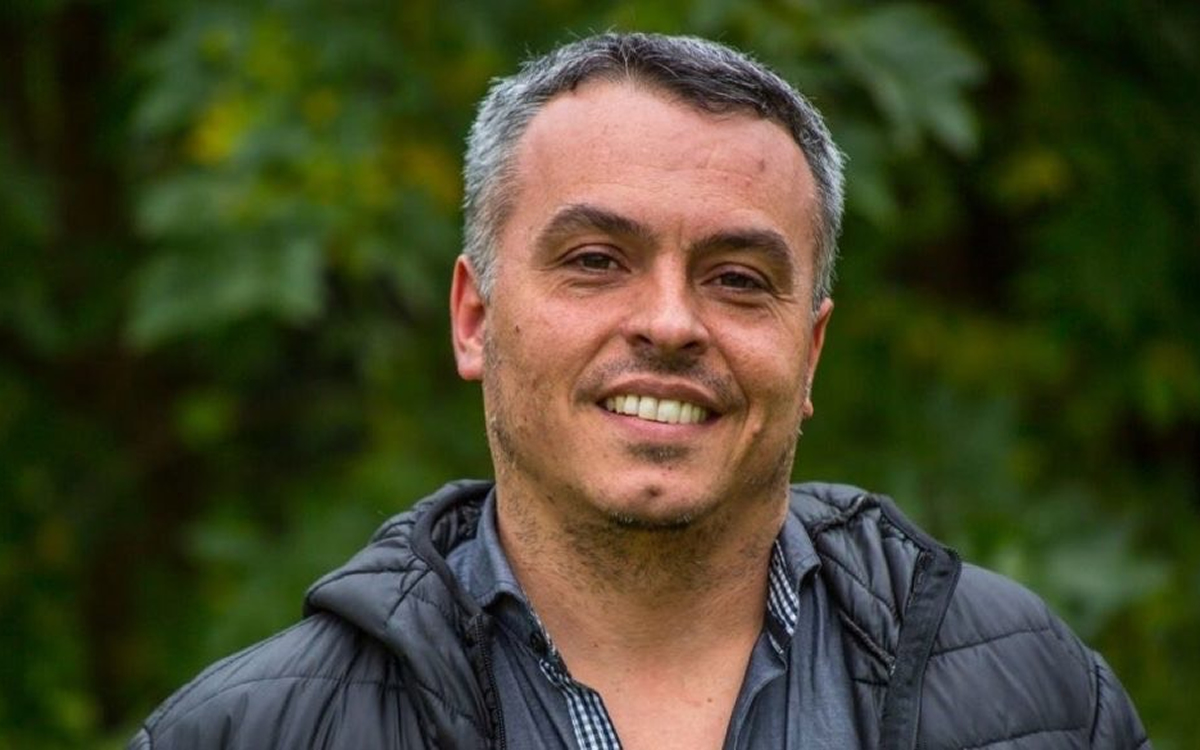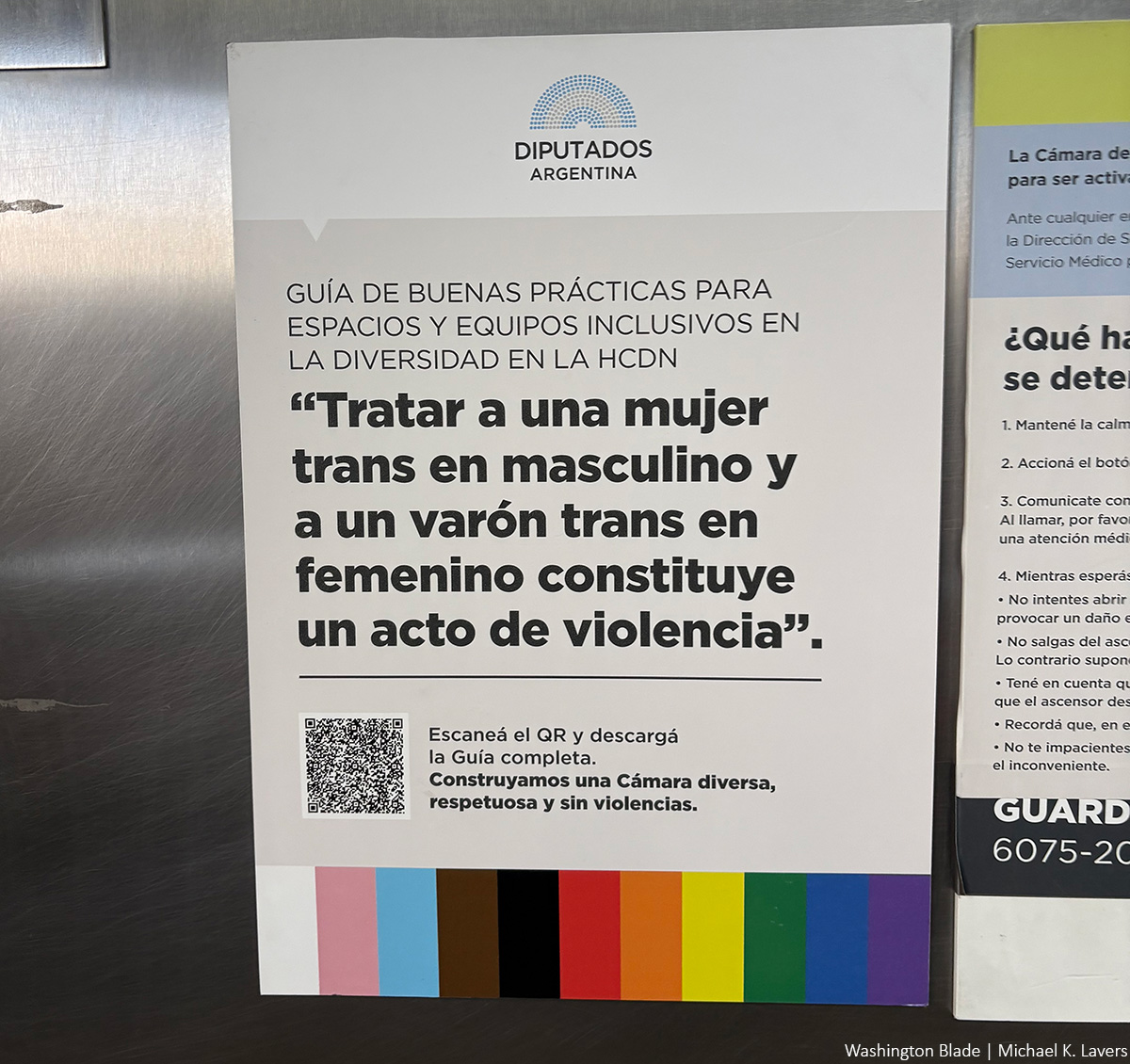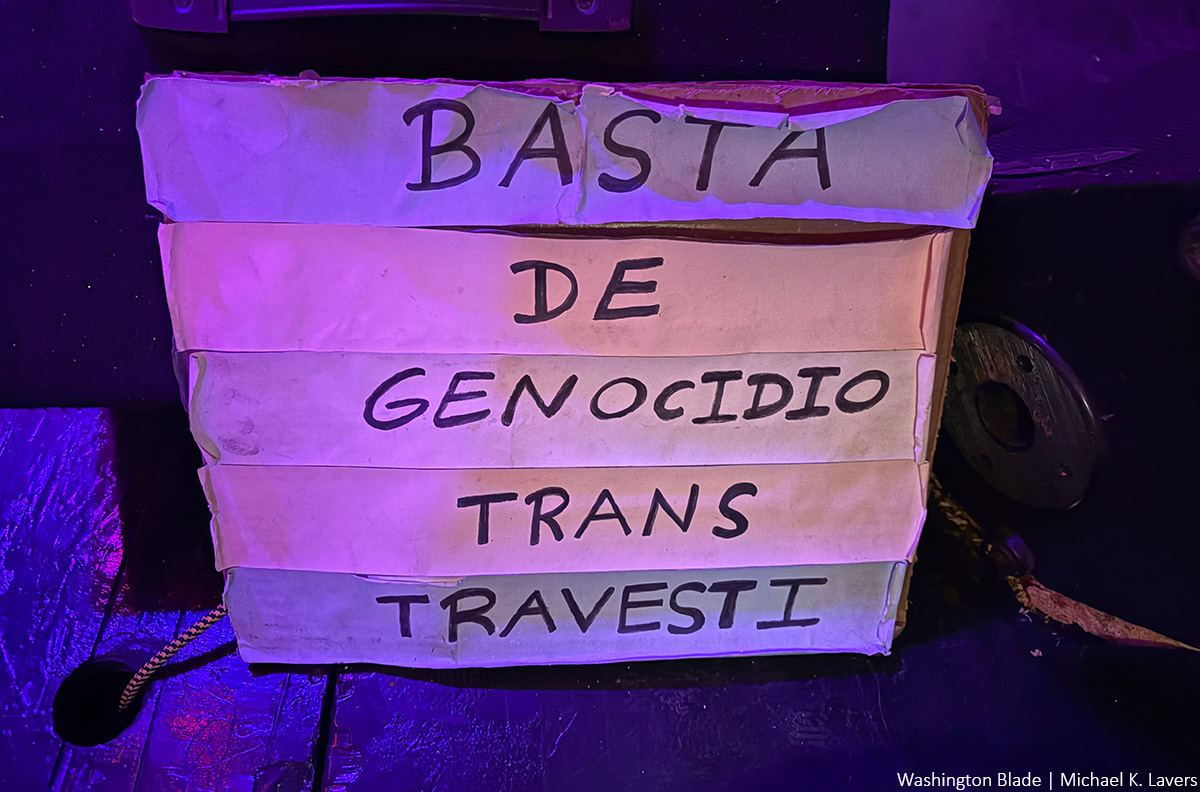Argentina
Javier Milei rolls back LGBTQ rights in Argentina during first year in office
Gay congressman, activists lead resistance against president

Javier Milei’s rise to power marked a sea change in Argentine politics that profoundly impacted the country’s LGBTQ community.
His first year in office has seen a combination of hostile rhetoric and concrete measures that have dismantled historic advances in human rights.
“Javier Milei’s administration is fighting a two-way battle,” Congressman Esteban Paulón, a long-time LGBTQ activist, pointed out to the Washington Blade. “On the one hand, symbolically, with an openly homo, lesbo and transodiant discourse, and on the other, in concrete facts, such as the closure of the Ministry of Women, Gender and Diversity, and INADI (the National Institute Against Discrimination, Xenophobia and Racism).”
The decision to eliminate these key institutions sent a clear message: Diversity policies are no longer a state priority. This dismantling left LGBTQ Argentines without national advocacy tools.
Some provinces have tried to fill this void, but many others have followed the national government’s lead. This trend, according to Paulón and other activists, has left LGBTQ Argentines even more vulnerable.
“What we are seeing is not only a setback in public policies, but also a direct attack on the dignity of thousands of people who, until recently, felt the support of the state,” said Paulón.
One of Milei administration’s first acts was to close the Women, Gender and Diversity Ministry and INADI. These decisions, which Milei said was necessary to reduce “unnecessary public spending,” eliminated agencies that played an essential role in the promotion of human rights and the fight against discrimination.
“Without these institutions, the LGBTQ community has been left unprotected against violence and prejudice. Now, discrimination cases that used to be handled by INADI end up shelved or without follow-up,” Paulón warned. “The message this sends is that our lives don’t matter to this government.”
Paulón and other activists say one of the Milei government’s most alarming decisions is to allow employers to fire employees without legal consequences.
“Today, a person can be fired because of their sexual orientation or gender identity, without the possibility of recovering their job,” warned Paulón.
The new policy has left many employees — especially transgender people — without legal recourse. Advocacy groups say companies have taken advantage of this regulation to carry out selective firings. The freezing of a trans-specific labor quota has deepened employment discrepancies for one of the country’s most vulnerable communities.
Paulón told the Blade that anti-LGBTQ rhetoric from Milei and several of his ministers has also had an effect on Argentine society.
“Today, anyone feels they can say anything without consequences,” said Paulón, who noted that ultraconservative and religious sectors view Milei’s government as an ally.
This rhetoric, according to Paulón, has yet to translate into widespread violence.
“We are not yet in a situation of systematic violence as in other countries, but the risk is there,” he said. “Every word of hate from power legitimizes violent actions.”
Congress, civil society leads resistance
In the face of this adverse scenario, resistance has taken various forms.
Paulón and other opposition lawmakers have worked on bills to protect LGBTQ rights and reverse regressive measures.
“We will not stand idly by. We put forward concrete proposals to guarantee access to health care, inclusive education and labor protections,” said Paulón.
Activists have strengthened alliances with their counterparts in neighboring countries, such as Brazil and Chile, and Mexico. They are also working with international organizations that have expressed concern about the situation in Argentina.
Although the outlook is bleak, Paulón said he remains hopeful.
“Milei is going to pass, like all processes in democracy,” he said.
Paulón stressed that marriage equality and the transgender rights law are deeply rooted in Argentine society, and act as barriers to stop further setbacks. The challenge now, he says, is to maintain resistance, organize the community, and strengthen international ties.
“We have an organized movement, tools to defend ourselves and a mostly plural and diverse society. This process will also come to an end,” said Paulón. “In this context, the struggle for LGBTQ rights in Argentina is a reminder that social conquests are never definitive and that resistance is vital to preserve the achievements made.”

Argentina
Gay Argentine congressman loses bid for country’s Senate
Esteban Paulón is a long-time activist, vocal Javier Milei critic.

A gay man who ran for the Argentine Senate lost in the country’s midterm elections that took place on Sunday.
Congressman Esteban Paulón, a long-time LGBTQ rights activist who has represented Santa Fe province in the country’s House of Deputies since 2023, ran to represent Buenos Aires, the Argentine capital, as a member of the Movimiento de Jublidaos y Juventud or “Movement of Young People and Retirees” party.
Paulón’s party received .6 percent of the total votes in the city.
“A new space that wants to be part of the construction of a future of development, equality, and growth for Argentina was born today in Buenos Aires,” said Paulón on Monday in a social media post.
“I want to think all of the residents of Buenos Aires who put their confidence in the citizen movement and who think another way to do politics is possible,” he added. “We are not here to pass through, we are here to continue growing. We’re convinced that Argentina needs a better approach.”
The elections took place two years after President Javier Milei took office.
Milei has enacted a series of anti-LGBTQ policies that include the closure of Argentina’s National Institute Against Discrimination, Xenophobia, and Racism and dismissing transgender people who the previous government hired under the Trans Labor Quota Law, which set aside at least 1 percent of public sector jobs for trans people. Paulón earlier this year filed a criminal complaint against Milei after he linked the LGBTQ community to pedophilia and made other homophobic and transphobic comments during a speech at the World Economic Forum in Davos, Switzerland.
The Associated Press notes Milei’s La Libertad Avanza party on Sunday won 14 seats in the Senate and 64 seats in the Chamber of Deputies, which is the lower house of Congress. The election took place against the backdrop of the Trump-Vance administration’s promised $40 billion bailout for Argentina if Milei won.
Paulón, for his part, will remain in the Chamber of Deputies.
Argentina
Argentine businesses promote inclusion in spite of anti-LGBTQ government policies
HRC Equidad Argentina 2025 report released in July

Argentina has reached a historic milestone in LGBTQ workplace inclusion.
Ninety-three organizations — including private companies, universities, and embassies — have implemented inclusive policies that now benefit 285,600 LGBTQ workers. This regional record stands in stark contrast to President Javier Milei’s dismantlement of public policies in this area — including the closure of the National Institute Against Discrimination, Xenophobia and Racism (INADI) and the Women, Gender, and Diversity Ministry.
The HRC Equidad Argentina 2025 report, which the Human Rights Campaign Foundation prepared with the LGBT+ Public Policy Institute, notes 60 organizations received the “Best Places to Work LGBT+” certification. This figure represents a 27 percent increase over the previous year.
In an economic context marked by inflation and recession, private companies are advancing where the state is retreating.
“At Equidad AR, we note this contradiction with concern: while the private sector is demonstrating a growing commitment to the inclusion of LGBT+ people in the workplace, the Argentine government has decided to defund, dismantle, or eliminate fundamental public policies on diversity,” said HRC Equidad AR Director Onax Cirlini. “Companies can make significant progress, but they cannot replace the role that the State should play as the guarantor of rights.”
The report comes at a time when Congress has approved an amendment to Argentina’s Basic Law that allows employers to fire their employees without cause. The measure could mean a major setback for the LGBTQ community: opening the door to terminations on discriminatory grounds and limiting financial compensation.
“This scenario, marked by the rise of hate speech and public policies that eliminate or restrict rights, has a direct impact on the working lives of LGBT+ people,” Cirlini noted. “It is not just a matter of good practices, but of active resistance to a model that weakens collective protections.”

One of the most significant developments the report noted was the addition of 16 national universities to the index, reflecting the education system’s commitment to cultural transformation. Historically absent sectors also began to support these efforts in all of Argentina’s 24 provinces.
Persistent structural inequalities, however, remain an obstacle.
María Rachid, president of the Argentine LGBT Federation, said workplace inclusion requires much more than good business practices.
“Centuries of exclusion, marginalization, and violence against the trans community cannot be resolved even with a few years of public policies,” she said. “It will require a lot of time, continuity of these policies, and affirmative action such as the trans employment quota, which is not currently being implemented at the national level, and measures that the current government is not guaranteeing.”
Milei’s administration since it took office in 2023 has dismantled key equality structures: it eliminated the Women, Gender, and Diversity Ministry; closed INADI, and cut funding for inclusion programs. Rachid said this setback is due to ideological convictions, as opposed to current socioeconomic and political circumstances.
“The government is not interested in public inclusion policies,” she warned. “They are deeply convinced that the state should not develop them. Nor are they interested in the private sector doing so. If it were up to them, the private sector would not do so either.”
Argentina
Two trans women document Argentina military dictatorship’s persecution
Carolina Boetti and Marzia Echenique arrested multiple times after 1976 coup

Editor’s note: Washington Blade International News Editor Michael K. Lavers was on assignment in Argentina and Uruguay from April 2-12, 2025.
ROSARIO, Argentina — Two transgender women in Argentina’s Santa Fe province are documenting the persecution of trans people that took place during the brutal military dictatorship that governed their country from 1976-1983.
Carolina Boetti and Marzia Echenique created the Travestí Trans Santa Fe Archive, which seeks to “create a collective memory,” in 2020. (“Travestí” is the Spanish word for “crossdresser.”)
The archive, among other things, includes interviews with trans women who the dictatorship arrested and tortured. The archive also contains photographs from that period.
The archive is not in a specific location, but Boetti and Echenique have given presentations at local schools and universities. They have also spoken at a museum in Rosario, the largest city in Santa Fe province that is roughly 200 miles northwest of Buenos Aires, the Argentine capital, that honors the dictatorship’s victims.
Boetti and Echenique during an April 11 interview at a Rosario hotel said they are trying to raise funds that would allow them to digitize the archive and house it in a permanent location.
“We have this material that is fantastic,” said Boetti.
The Associated Press notes human rights groups estimate the dictatorship killed or forcibly disappeared upwards of 30,000 people in what became known as the “dirty war.” The dictatorship specifically targeted students, journalists, labor union leaders, and anyone else who it thought posed a threat.
The dictatorship first detained Echenique in 1979 when she was 16. She said it targeted her and other trans women because they were “not within that strict” binary of man and woman.
“There was a dictator during the dictatorship, and he dictated this binarism, and there was no other way than man or woman,” Echenique told the Blade. “Everything else was penalized, deprived of all rights. They took away everything.”
Boetti was 15 when the dictatorship first detained her.
“They detained me because of my sexual orientation,” she told the Blade. “Homosexuality in those years was penalized under the law.”
Boetti said the law in 1982 — the year when she began her transition — penalized crossdressing, prostitution and vagrancy with up to 120 days in jail. Boetti told the Blade that authorities “constantly detained me” from 1982 until she left Argentina in the 1990s.
Echenique said the regime once detained her for six months.
“The way of living, of studying, of walking freely down the street, of living somewhere, of sitting down to eat something in a bar or how we are sitting today, for example, was unthinkable in those years,” she said.
Echenique left Argentina in 1988, three years after the dictatorship ended. She returned to the country in 2006.
“The dictatorship ended in ’83, but not for the trans community,” she said.
Rosario and Santa Fe, the provincial capital, in 2018 implemented a reparation policy for trans people who suffered persecution under the dictatorship. They remain the only cities in Argentina with such a program.
Boetti on May 17, 2018, during an International Day Against Homophobia, Biphobia, and Transphobia ceremony over which then-Santa Fe Gov. Miguel Lifshitz presided became the first trans person in Argentina to receive reparations. Boetti receives a monthly pension of ARG 40,000 ($34.48) and a monthly stipend that pays for her health care.
Those who have received reparations successfully presented evidence to a judge that proved they suffered persecution and repression during the dictatorship. Boetti and Echenique pointed out that only 10 of the 50 trans women in Santa Fe who the dictatorship are known to have persecuted are still alive.

Post-dictatorship Argentina became global trans rights leader
Then-President Cristina Fernández de Kirchner in 2012 signed Argentina’s landmark Gender Identity Law that, among other things, allows trans and nonbinary people to legally change their gender without medical intervention. The country in 2010 extended marriage rights to same-sex couples.
Then-President Alberto Fernández, who is unrelated to Cristina Fernández, in 2020 signed the Trans Labor Quota Law, which set aside at least 1 percent of public sector jobs for trans people. Fernández in 2021 issued a decree that allowed nonbinary Argentines to choose an “X” gender marker on their National Identity Document or DNI.

Alba Rueda, a trans woman and well-known activist, in 2022 became Argentina’s special envoy for LGBTQ and intersex rights.
President Javier Milei has implemented several anti-trans measures since he took office in December 2023. These include a decree that restricts minors’ access to gender-affirming surgeries and hormone treatment and the dismissal of trans people who the government hired under the Trans Labor Quota Law.
Milei closed the National Institute Against Discrimination, Xenophobia, and Racism, a government agency known by the acronym INADI that provided support and resources to people who suffered discrimination based on sexual orientation, gender identity, and other factors. He also eliminated Argentina’s Women, Gender, and Diversity Ministry under which Rueda worked until Fernández left office.

Gay Congressman Esteban Paulón, a long-time LGBTQ activist, in January filed a criminal complaint against Milei after he linked the LGBTQ community to pedophilia and made other homophobic and transphobic comments during a speech at the World Economic Forum in Davos, Switzerland. Paulón is among those who attended the 2018 ceremony during which Boetti received her reparations.
Echenique noted the restoration of democracy in Argentina did not end anti-trans discrimination and persecution in the country.
“We came from the period of the dictatorship, but we do not forget that everything didn’t end then,” she said. “The persecutions were worse than what we suffered during the period of the dictatorship once democracy returned.”

Boetti said she does not think Argentina will once again become a dictatorship under Milei.
“But unfortunately, there is a lot of harassment and a lot of hate speech,” said Boetti.
“There are now laws that protect us, but there is a fight for sure,” added Echenique. “I don’t think we’ll go back to how things were before, and that’s why I again emphasize the importance of archiving memory in this.”
-

 Sponsored4 days ago
Sponsored4 days agoSafer Ways to Pay for Online Performances and Queer Events
-

 District of Columbia3 days ago
District of Columbia3 days agoTwo pioneering gay journalists to speak at Thursday event
-

 Colombia3 days ago
Colombia3 days agoBlade travels to Colombia after U.S. forces seize Maduro in Venezuela
-

 a&e features3 days ago
a&e features3 days agoQueer highlights of the 2026 Critics Choice Awards: Aunt Gladys, that ‘Heated Rivalry’ shoutout and more



















